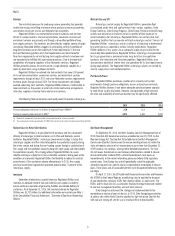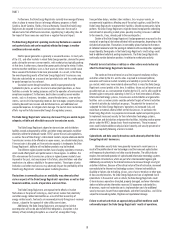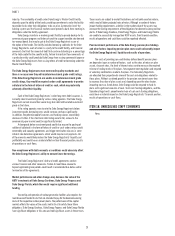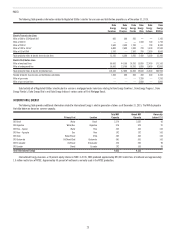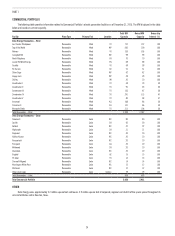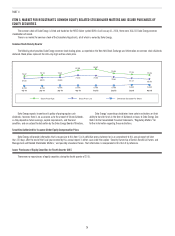Duke Energy 2015 Annual Report Download - page 38
Download and view the complete annual report
Please find page 38 of the 2015 Duke Energy annual report below. You can navigate through the pages in the report by either clicking on the pages listed below, or by using the keyword search tool below to find specific information within the annual report.
PART I
18
Furthermore, the Duke Energy Registrants currently have energy efficiency
riders in place to recover the cost of energy efficiency programs in North
Carolina, South Carolina, Florida, Ohio and Kentucky. Should the Duke Energy
Registrants be required to invest in conservation measures that result in
reduced sales from effective conservation, regulatory lag in adjusting rates for
the impact of these measures could have a negative financial impact.
The Duke Energy Registrants’ operating results may fluctuate on a seasonal
and quarterly basis and can be negatively affected by changes in weather
conditions and severe weather.
Electric power generation is generally a seasonal business. In most parts
of the U.S., and other markets in which Duke Energy operates, demand for power
peaks during the warmer summer months, with market prices typically peaking
at that time. In other areas, demand for power peaks during the winter. Further,
extreme weather conditions such as heat waves or winter storms could cause
these seasonal fluctuations to be more pronounced. As a result, in the future,
the overall operating results of the Duke Energy Registrants’ businesses may
fluctuate substantially on a seasonal and quarterly basis and thus make period-
to-period comparison less relevant.
Sustained severe drought conditions could impact generation by
hydroelectric plants, as well as fossil and nuclear plant operations, as these
facilities use water for cooling purposes and for the operation of environmental
compliance equipment. Furthermore, destruction caused by severe weather
events, such as hurricanes, tornadoes, severe thunderstorms, snow and ice
storms, can result in lost operating revenues due to outages; property damage,
including downed transmission and distribution lines; and additional and
unexpected expenses to mitigate storm damage. The cost of storm restoration
efforts may not be fully recoverable through the regulatory process.
The Duke Energy Registrants’ sales may decrease if they are unable to gain
adequate, reliable and affordable access to transmission assets.
The Duke Energy Registrants depend on transmission and distribution
facilities owned and operated by utilities and other energy companies to deliver
electricity sold to the wholesale market. FERC’s power transmission regulations,
as well as those of Duke Energy’s international markets, require wholesale electric
transmission services to be offered on an open-access, non-discriminatory basis.
If transmission is disrupted, or if transmission capacity is inadequate, the Duke
Energy Registrants’ ability to sell and deliver products may be hindered.
The different regional power markets have changing regulatory structures,
which could affect growth and performance in these regions. In addition, the
ISOs who oversee the transmission systems in regional power markets have
imposed in the past, and may impose in the future, price limitations and other
mechanisms to address volatility in the power markets. These types of price
limitations and other mechanisms may adversely impact the profitability of the
Duke Energy Registrants’ wholesale power marketing business.
Fluctuations in commodity prices or availability may adversely affect
various aspects of the Duke Energy Registrants’ operations as well as their
financial condition, results of operations and cash flows.
The Duke Energy Registrants are exposed to the effects of market
fluctuations in the price of natural gas, coal, fuel oil, nuclear fuel, electricity
and other energy-related commodities as a result of their ownership of
energy-related assets. Fuel costs are recovered primarily through cost-recovery
clauses, subject to the approval of state utility commissions.
Additionally, the Duke Energy Registrants are exposed to risk that
counterparties will not be able to fulfill their obligations. Disruption in the
delivery of fuel, including disruptions as a result of, among other things,
transportation delays, weather, labor relations, force majeure events, or
environmental regulations affecting any of these fuel suppliers, could limit the
Duke Energy Registrants to operate their facilities. Should counterparties fail to
perform, the Duke Energy Registrants might be forced to replace the underlying
commitment at prevailing market prices possibly resulting in losses in addition
to the amounts, if any, already paid to the counterparties.
Certain of the Duke Energy Registrants’ hedge agreements may result in the
receipt of, or posting of, derivative collateral with counterparties, depending on the
daily derivative position. Fluctuations in commodity prices that lead to the return
of collateral received and/or the posting of collateral with counterparties negatively
impact liquidity. Downgrades in the Duke Energy Registrants’ credit ratings could
lead to additional collateral posting requirements. The Duke Energy Registrants
continually monitor derivative positions in relation to market price activity.
Potential terrorist activities or military or other actions could adversely
affect the Duke Energy Registrants’ businesses.
The continued threat of terrorism and the impact of retaliatory military
and other action by the U.S. and its allies may lead to increased political,
economic and financial market instability and volatility in prices for natural
gas and oil, which may have material adverse effects in ways the Duke Energy
Registrants cannot predict at this time. In addition, future acts of terrorism and
possible reprisals as a consequence of action by the U.S. and its allies could be
directed against companies operating in the U.S. or their international affiliates.
Information technology systems, transmission and distribution and generation
facilities such as nuclear plants could be potential targets of terrorist activities
or harmful activities by individuals or groups. The potential for terrorism has
subjected the Duke Energy Registrants’ operations to increased risks and
could have a material adverse effect on their businesses. In particular, the
Duke Energy Registrants may experience increased capital and operating costs
to implement increased security for their information technology systems,
transmission and distribution and generation facilities, including nuclear power
plants under the NRC’s design basis threat requirements. These increased
costs could include additional physical plant security and security personnel or
additional capability following a terrorist incident.
Cyberattacks and data security breaches could adversely affect the Duke
Energy Registrants’ businesses.
Information security risks have generally increased in recent years as a
result of the proliferation of new technologies and the increased sophistication
and frequency of cyberattacks and data security breaches. The utility industry
requires the continued operation of sophisticated information technology systems
and network infrastructure, which are part of an interconnected regional grid.
Additionally, connectivity to the Internet continues to increase through smart grid
and other initiatives. Because of the critical nature of the infrastructure, increased
connectivity to the Internet and technology systems’ inherent vulnerability to
disability or failures due to hacking, viruses, acts of war or terrorism or other types
of data security breaches, the Duke Energy Registrants face a heightened risk of
cyberattack. In the event of such an attack, the Duke Energy Registrants could
(i) have business operations disrupted, property damaged, customer information
stolen and other private information accessed (ii) experience substantial loss
of revenues, repair and restoration costs, implementation costs for additional
security measures to avert future cyberattacks and other financial loss, and (iii) be
subject to increased regulation, litigation and reputational damage.
Failure to attract and retain an appropriately qualified workforce could
unfavorably impact the Duke Energy Registrants’ results of operations.



